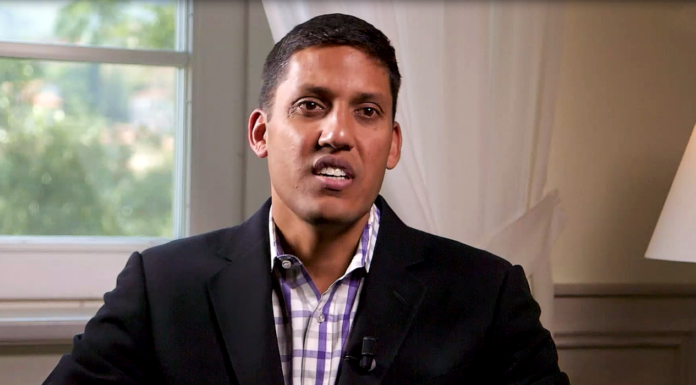(Headline USA) The Rockefeller Foundation—a far-left “philanthropy” created more than a century ago to help inheritors in one of the world’s wealthiest families shelter their assets—may be pushing for an even bigger power-grab than when the family patriarch once held a monopoly on the U.S. oil industry.
The globalist organization now plans to make the fight against climate change central to all of its work, including its operations and investments.
In a public letter released Tuesday, foundation president, Dr. Rajiv J. Shah, acknowledged the “irony” that his organization’s founder John D. Rockefeller “made his fortune by fueling a growing United States with carbon.”
Speaking to the Associated Press in advance of the announcement, Shah said that all institutions that benefited from the development driven by fossil fuels have a responsibility to battle climate change.
“Obviously, an institution like the Rockefeller Foundation has an even higher level of responsibility because we’re an even bigger beneficiary of that process,” he said. The Rockefeller Foundation funds part of the Associated Press’ coverage of climate change.
Despite that earnest insistence, the flip–flop undoubtedly has the wealth and self-interest if its stakeholders above all else. Funneling its funding into the green agenda would seem to be an investment strategy aligned with other billionaire oligarchs—including the Trilateral Commission that grandson David Rockefeller helped found.
“Some even believe we [the Rockefeller family] are part of a secret cabal working against the best interests of the United States, characterizing my family and me as ‘internationalists’ and of conspiring with others around the world to build a more integrated global political and economic structure—one world, if you will,” the former Chase Manhattan CEO wrote in his memoirs.
“If that’s the charge, I stand guilty, and I am proud of it,” Rockefeller added.
The Rockefeller Foundation has been funding environmental extremism for at least a decade, having been linked back to a 2012 closed-door meeting in La Jolla, Calif., where radical activist first devised a plan to harass and sue companies that refused to bend the knee to their demands.
That movement, oftentimes weaponizing indoctrinating children to do its dirty work, has been widely successful and lucrative.
The foundation’s commitment builds on its prior decision to divest its more than $6 billion endowment from fossil fuels starting in 2020, though it still has what Shah called negligible exposure.
The foundation also partnered with the Ikea Foundation and the Bezos Earth Fund to launch an international consortium to accelerate the transition to renewable energy, with all three nonprofits giving $500 million. The consortium has since raised around $10 billion in additional funds, the foundation said.
Partnerships like that reflect the Rockefeller Foundation’s belief that it can alter the course of history by amplifying the scope of its work and its resources—in effect empowering unelected billionaires colluding together to decide the fate of all its citizens.
“The reason for doing this is basically to put down a marker about our ambition, our sense of urgency and our willingness to be transformational in order to deepen our partnerships with others, to try to actually change the course of the climate equation on this planet,” Shah said.
The Rockefeller Foundation plans to take a year to study where it can make the most impactful partnerships and investments.
“Our process is really less about closing, locking ourselves in a closet and reading and modeling spreadsheets, and more about listening to and speaking to leading individuals, institutions, heads of state and the people we ultimately serve,” Shah said. “And understanding how philanthropy can best marshal support for their boldest and most urgent ideas.”
The foundation remains committed to its current grantees, a spokesperson said, adding “Because climate change is the biggest threat of our time, it requires us to remain adaptable and learn alongside our grantees and partners.”
It argues that the new commitment does not represent a change from its mission “to promote the well-being of humanity throughout the world.”
Established in 1913, the foundation focused on public health, including mass vaccination campaigns and the founding of public health authorities around the world.
Its first environment-related program launched in 1969.
The foundation’s current work continues to focus on public health as well as access to renewable energy, economic equity and food access—most appearing to fall in line with key aspects of the leftist agenda.
In 2021, the foundation said it had distributed the equivalent of $22 billion in its history.
However, Shah says a response to the climate crisis is urgent. Data show philanthropic giving to climate-change mitigation represented just 2% of total global philanthropic giving in 2020, according to an analysis by the organization ClimateWorks Foundation.
“Combine that with the lack of action happening at the requisite levels of governments and businesses and then the trillions that need to be unlocked,” said Shawn Reifsteck, vice president for ClimateWorks. “We need essentially more and more funders doing more things at increased levels.”
So-called climatologists have fed the panicmongering as part of a racket to secure more funding for their research.
In April, the Intergovernmental Panel on Climate Change issued a report that warned of an unlivable world unless greenhouse gas emissions are cut faster than countries’ current commitments.
Marion Gee, co-executive director of the extremist Climate Justice Alliance, said it was encouraging that a large foundation would want to make confronting climate change central to their work but said foundations also need to challenge the economic system that perpetuates it, including divestment.
“How are you moving that money out of Wall Street where a lot of the problems that we are facing today have been caused by these corporations,” and moving the funds into local, sustainable economies, Gee asked.
ClimateWorks’ analysis does show foundations donating more to climate-change mitigation on an annual basis in the last five years, with the total increasing from $900 million in 2015 to $1.9 billion in 2020.
“We’re hopeful that that continues and in fact, accelerates,” Reifsteck said.
Adapted from reporting by the Associated Press

